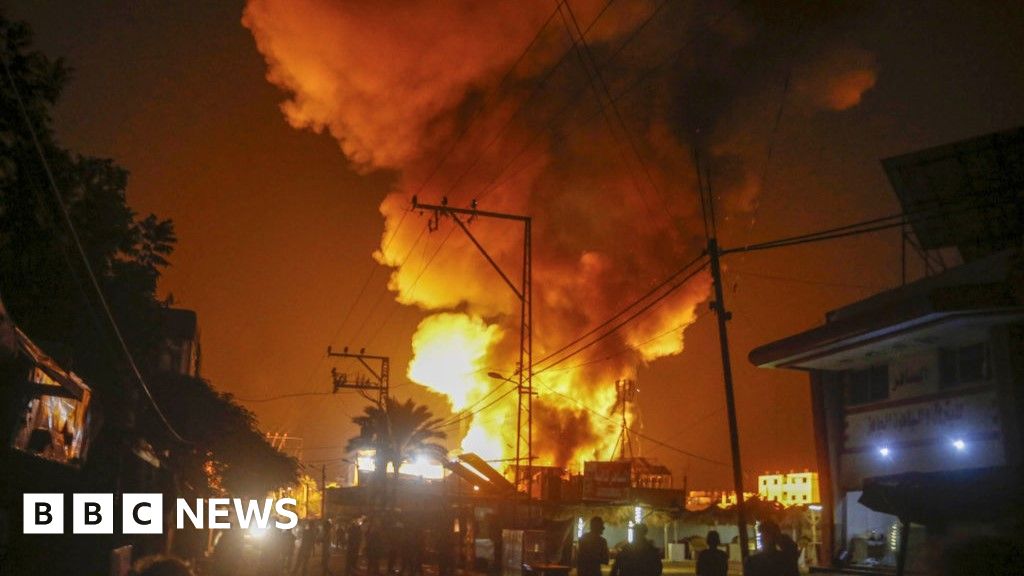
Warning: This story contains details that some may find disturbing
Eyewitnesses to the Israeli air strike and resulting camp fire in a hospital complex in Gaza told the BBC of their horror and helplessness at seeing the wounded and dead in the flames.
One mother described it as “one of the worst scenes we have seen”, while an injured girl said she heard screaming as people tore down their tent to get them out. One man said he “broke down” because he was “unable to do anything” to help those who burned to death.
The strike hit the Al-Aqsa Hospital complex in Deir al-Balah, in the central Gaza Strip, in the early hours of Monday morning, igniting a fire that burned down temporary shelters for displaced people.
At least four people were killed and dozens injured, most of them women and children, according to the Hamas-run Health Ministry.
The BBC verified the location of a video showing what appears to be a person on fire. Other footage shows people rushing to extinguish the flames amid screams and explosions that send fireballs into the night sky.
The Israeli military said it targeted Hamas fighters operating inside a command center in the parking lot, after which a fire broke out “most likely due to secondary explosions.” The military said the incident was under review.
Doctors Without Borders, which has staff working in Al-Aqsa, told the BBC it had “no knowledge” of the existence of a Hamas centre, and said “the hospital operates as a hospital.”
The UN humanitarian agency said in a statement that “people were burned to death” and “the atrocities must end,” while a White House National Security Council spokesman described the footage as “disturbing.”
“The images and videos showing displaced civilians burning alive after an Israeli airstrike are deeply disturbing, and we have made our concerns clear to the Israeli government,” the spokesperson told BBC partner CBS.
“Israel has a responsibility to do more to avoid civilian casualties – and what happened here is horrific, even if Hamas was operating near the hospital in an attempt to use civilians as human shields.”
Witnesses said the raid took place at around 01:15 local time on Monday (23:15 GMT on Sunday).
Anna Halford, MSF’s emergency coordinator in Gaza, who was not in the hospital during the raid, said in a phone call from Deir al-Balah.
Heba Radhi, a mother who lives in a tent behind the hospital, told the BBC’s independent correspondent in Gaza that she woke up to the sound of “explosions and fires that broke out around the tents.”
“There were explosions everywhere, and we were shocked to learn whether it was gas or weapons,” she said.
She added: “This is one of the worst scenes we have witnessed and lived through. We have never witnessed such destruction before.” “It’s hard, really hard.”
Attia Darwish, a photographer who recorded some of the verified videos, told the BBC that it was a “huge shock” and that he was “unable to do anything” as he watched people burn.
“I was absolutely devastated,” he said.
Umm Yasser Abdel Hamid Daher, who also lives in the hospital, told the BBC: “We saw so many people burning that we started to feel as if we might burn like them.”
Among the injured were her son, his wife, and his children. Her granddaughter Lina (11 years old), who was injured by shrapnel in her hand and leg, said that she heard people screaming.
Our neighbor’s daughter was hit in the head and her father was killed. Our other neighbors were killed. “The people next to us tore down the tent to get us out,” she said.
Her grandmother said that the family “lost their tent and everything they owned; “There is nothing left for them.”
The Ministry of Health reported on Monday that more than 40 people were injured and four killed.
On Tuesday, Doctors Without Borders announced a higher toll, saying five people had died and their bodies burned by the time they were recovered, and 65 others were injured.
Forty of the wounded – 22 men, eight women and 10 children – remained in Al-Aqsa Mosque. The others were transferred to different hospitals, where eight of them were transferred to the specialized burns unit.
Ms Halford said her colleagues were treating burn victims who “definitely won’t survive”, saying: “There’s not much you can do for burn victims this serious.”
“You come home and smell it on your clothes. It’s a profoundly moving experience. It stays with you,” she said.
Ms Halford said Monday’s strike was the seventh on the hospital site since March, and the third in two weeks.
When she arrived at the hospital after the latest strike, she said she found people searching through twisted metal and burning debris to salvage any possessions.
Another mother the BBC spoke to whose children suffered burns has already been evacuated from northern Gaza – and now has nothing.
The acting head of the United Nations Office for the Coordination of Humanitarian Affairs said that the raid occurred in an area to which residents of northern Gaza were asked to move.
“There is no safe place in Gaza for people to go,” the statement read.
Additional reporting by Haneen Abdeen

“Travel specialist. Typical social media scholar. Friend of animals everywhere. Freelance zombie ninja. Twitter buff.”





More Stories
Taiwan is preparing to face strong Typhoon Kung-ri
Israel orders residents of Baalbek, eastern Lebanon, to evacuate
Zelensky: North Korean forces are pushing the war with Russia “beyond the borders”